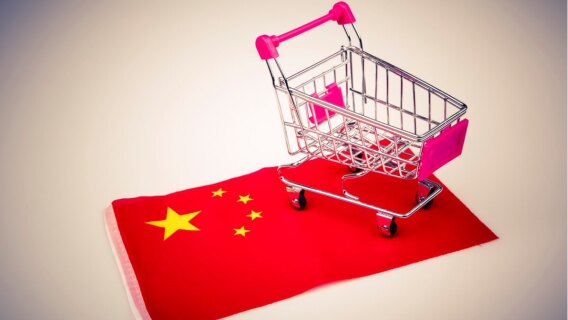Investing is all about judging potential risks versus rewards and then weighing the probabilities of outcomes.
It is rarely cut and dried and normally takes some digging and thinking.
This is clearly the case with the Chinese stock market and its leading Internet and consumer stock – Alibaba (BABA).
[text_ad]
China’s economy is struggling due to among other issues, lackluster growth, falling property prices, high local debt, poor demographic trends, and lack of consumer confidence.
While we should remain China skeptics, it would be folly to discount China coming back strong with the right policies. In my view, China is both strong and brittle.
To put this in perspective, in the first 19 years of this century right up to the pandemic, the American economy grew on average about 2% each year. That means expected U.S. growth this year is about where it’s been for the past two decades.
China’s economy expanded, on average, 9% a year from 2000 to 2019, as you can see in the chart from Trading Economics above. Now China’s growth seems to be slowing to about half that pace. China’s economic growth trajectory had to flatten at some point.
Alibaba is one of China’s most well-known brands and the country’s largest e-commerce company. The stock got knocked down over the last few years thanks to a heavy political hand by the Chinese government and a sluggish consumer economy.
The shares are now selling at a cheap valuation but is Alibaba a value trap or a great contrarian turnaround story? Can the company leverage its massive consumer platform into new areas of growth such as cloud computing and artificial intelligence (AI)?
A great majority of Alibaba’s core revenue from retail comes from marketing services and other fees charged to merchants, and the transaction values from Taobao and Tmall make up half of China’s e-commerce market.
After seeing revenue for the commerce segment rise 4% in the fiscal year ending in March, Taobao and Tmall reported high-single-digit gross merchandise volume (GMV) growth and double-digit order growth in the last quarter, indicating a stronger consumer economy in China. Another growth area is the international digital commerce group, including results from Aliexpress, where revenue surged 32% year over year last quarter.
Like Amazon, Alibaba has a web of businesses, including revenue streams from cloud services, entertainment, logistics, and, increasingly, artificial intelligence (AI). Alibaba basically facilitates transactions between buyers and sellers. The company is a huge data-gathering network, which is a competitive advantage and moat. It uses all the data gathered from communications and transactions across all its various business units to improve productivity and growth.
Its cloud business is China’s closest comparison to Amazon Web Services. Founded in 2009, the business now known as Cloud Intelligence provides data processing and storage services to thousands of businesses, developers, and government organizations in more than 200 countries and regions, according to its website. It contributed $3.5 billion of revenue to Alibaba in the 12 months to March 31 and has been enjoying triple-digit year-over-year revenue growth.
Alibaba stock’s forward price-to-earnings ratio is about 11, which is starting to attract attention, but questions remain about whether the heyday of China’s Internet giants is over.
Will Beijing allow Alibaba to seize the global opportunities before it? Can the company regain the momentum of its glory days before the crackdown on many leading Chinese private enterprises?
Given that Alibaba (BABA) stock has risen 17% in just the last month, investors have clearly been betting that it can.
[author_ad]


